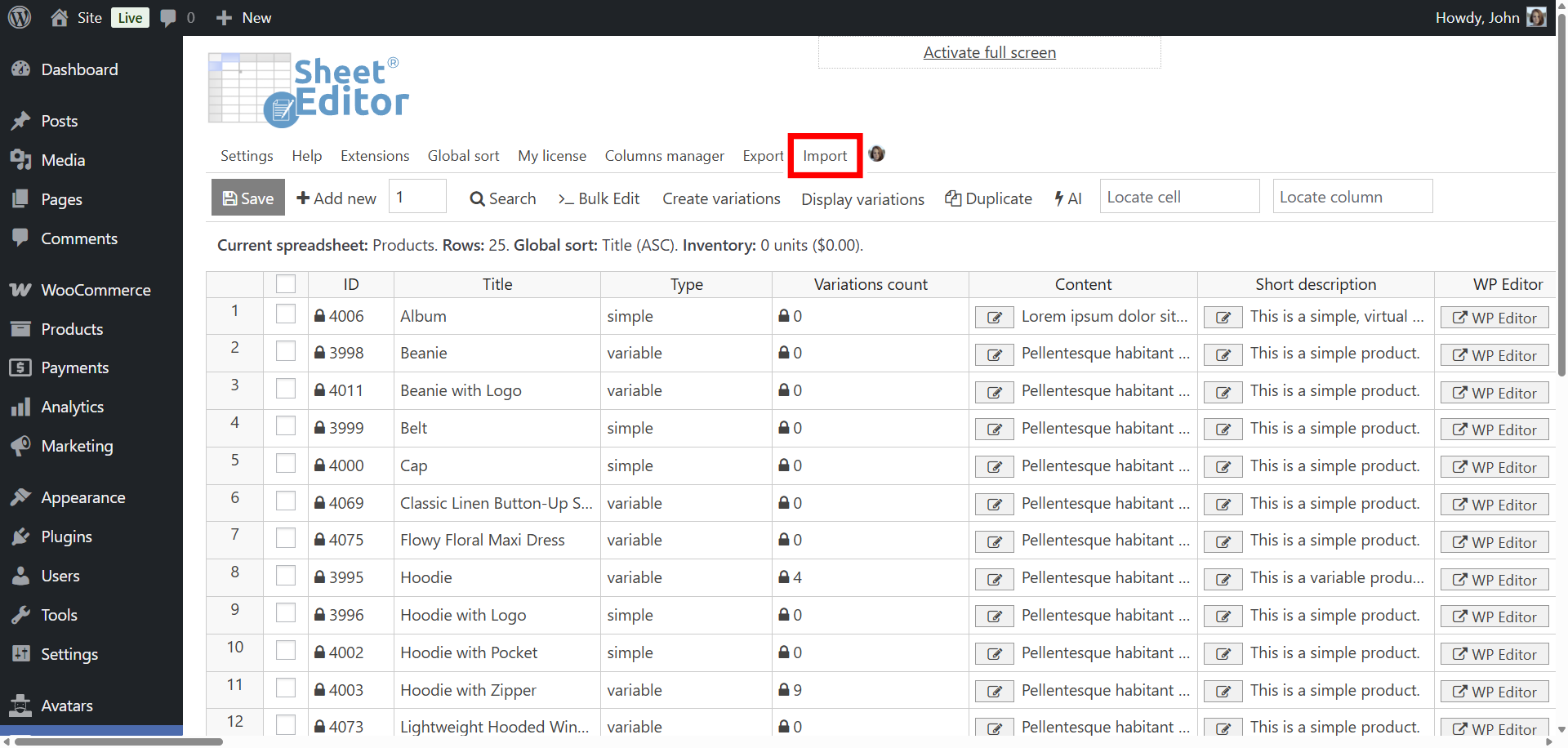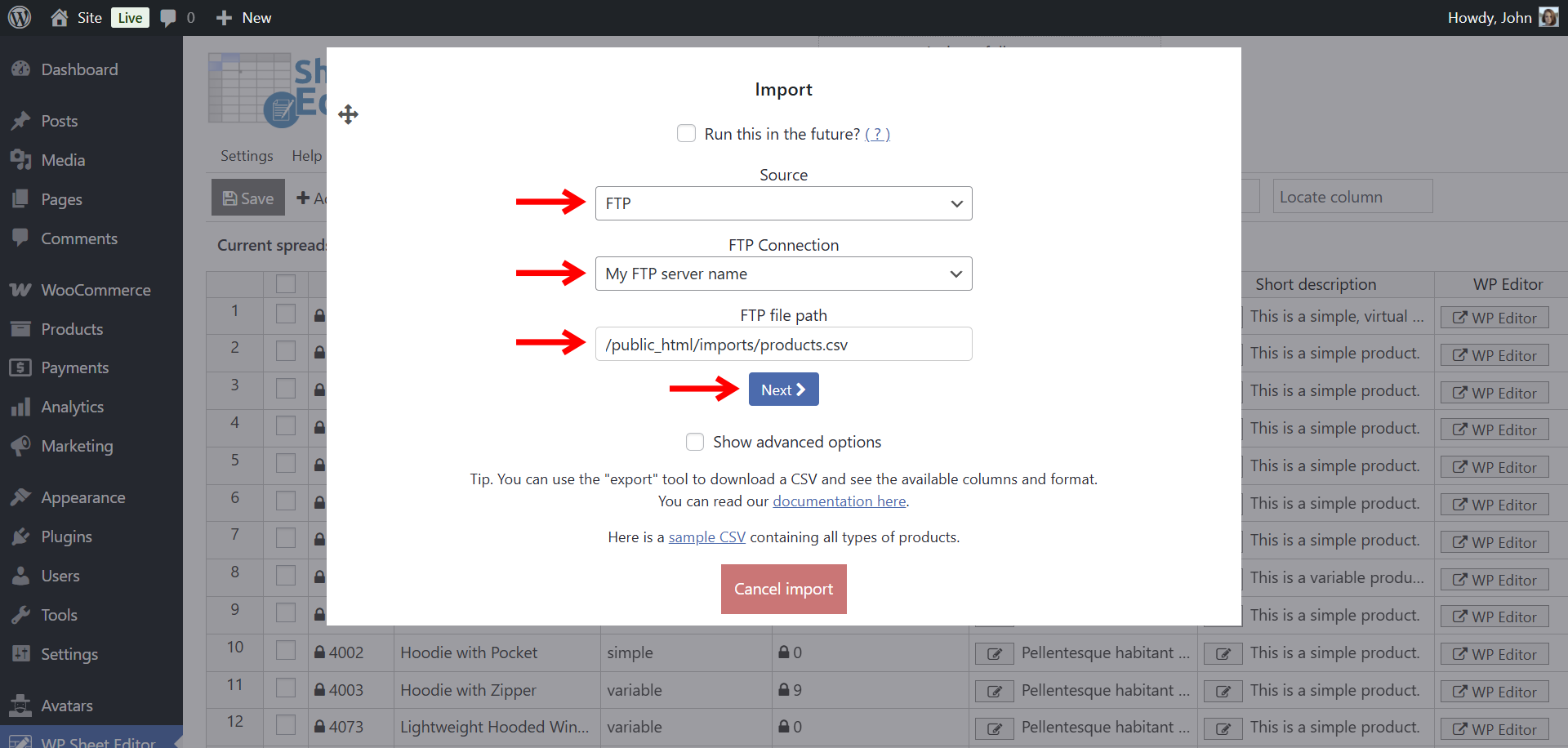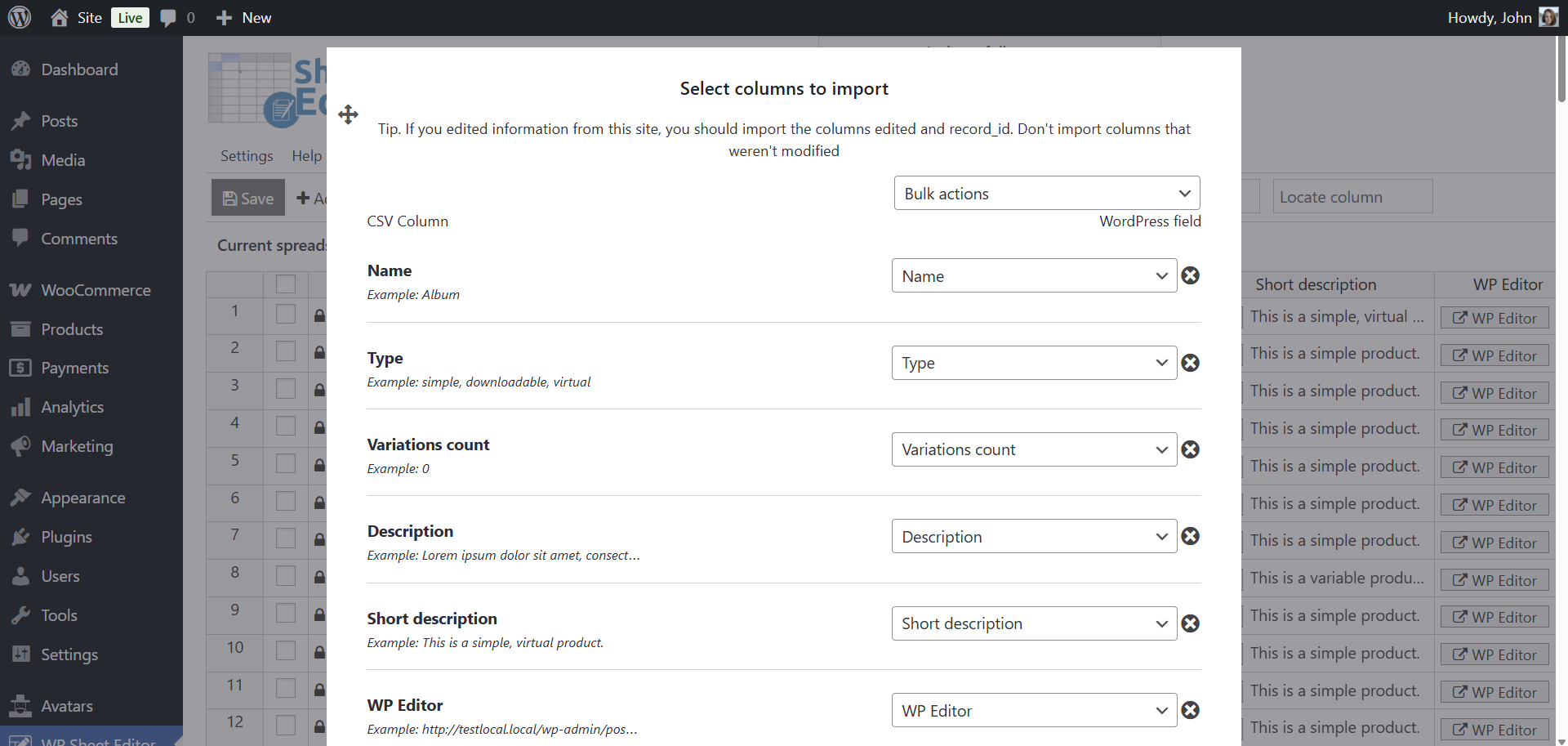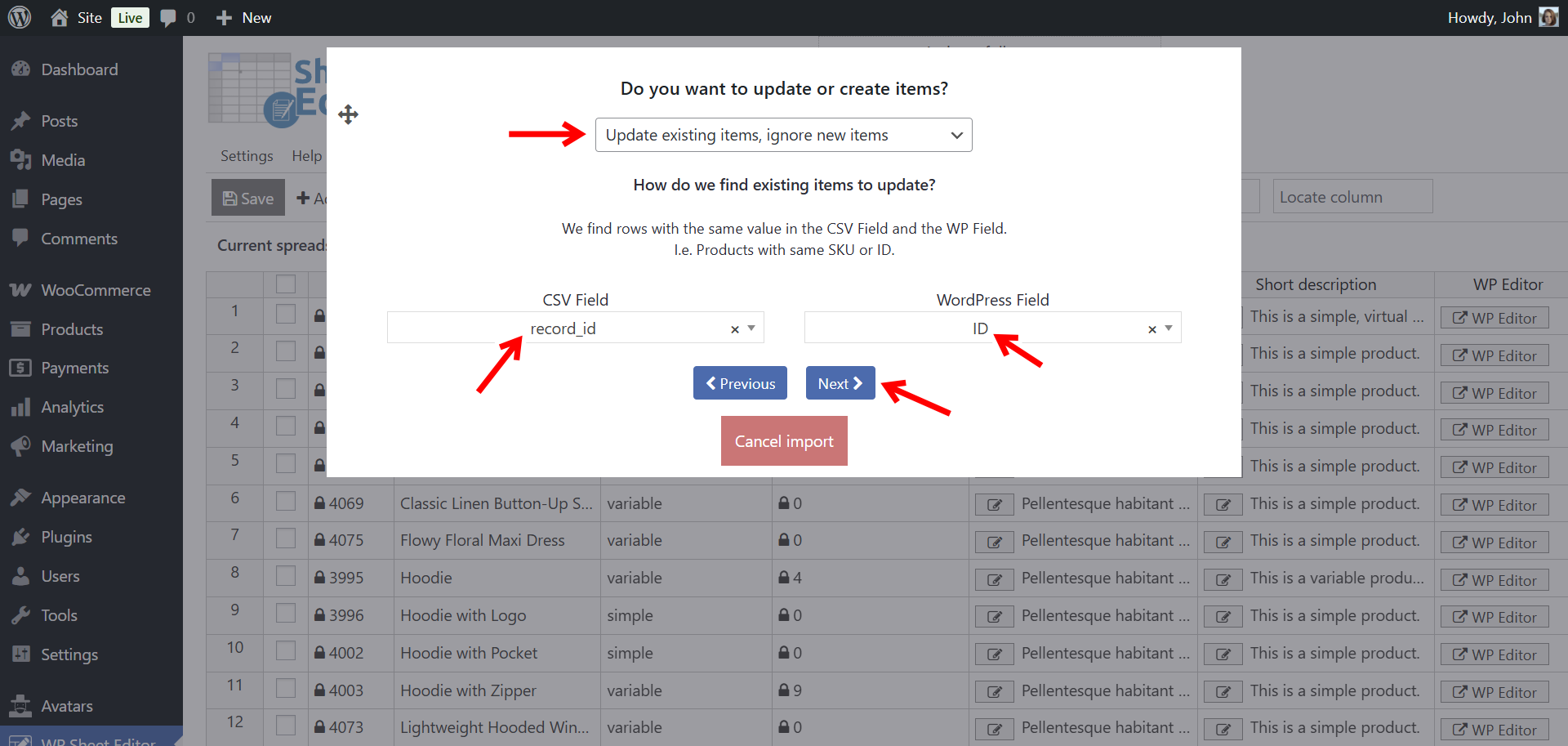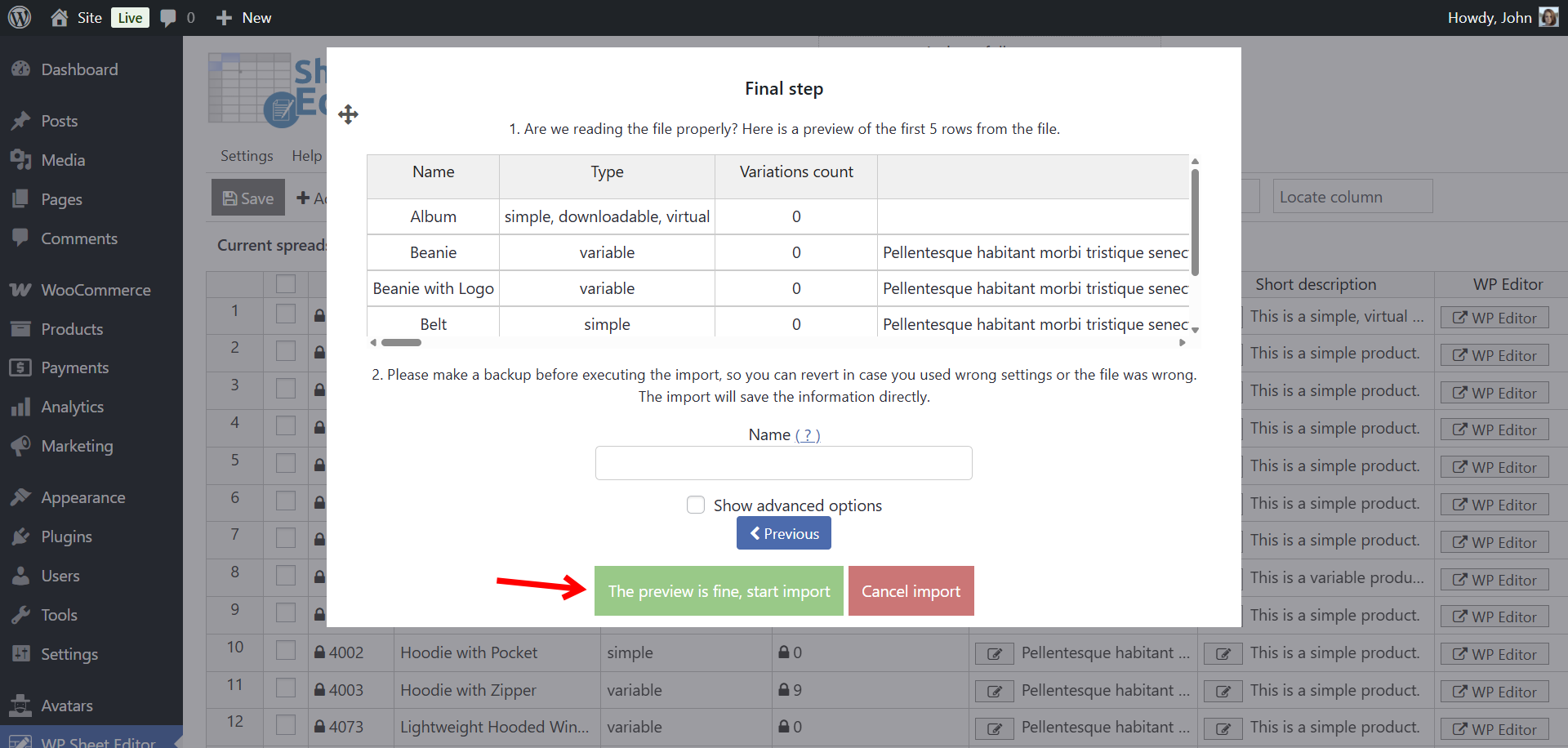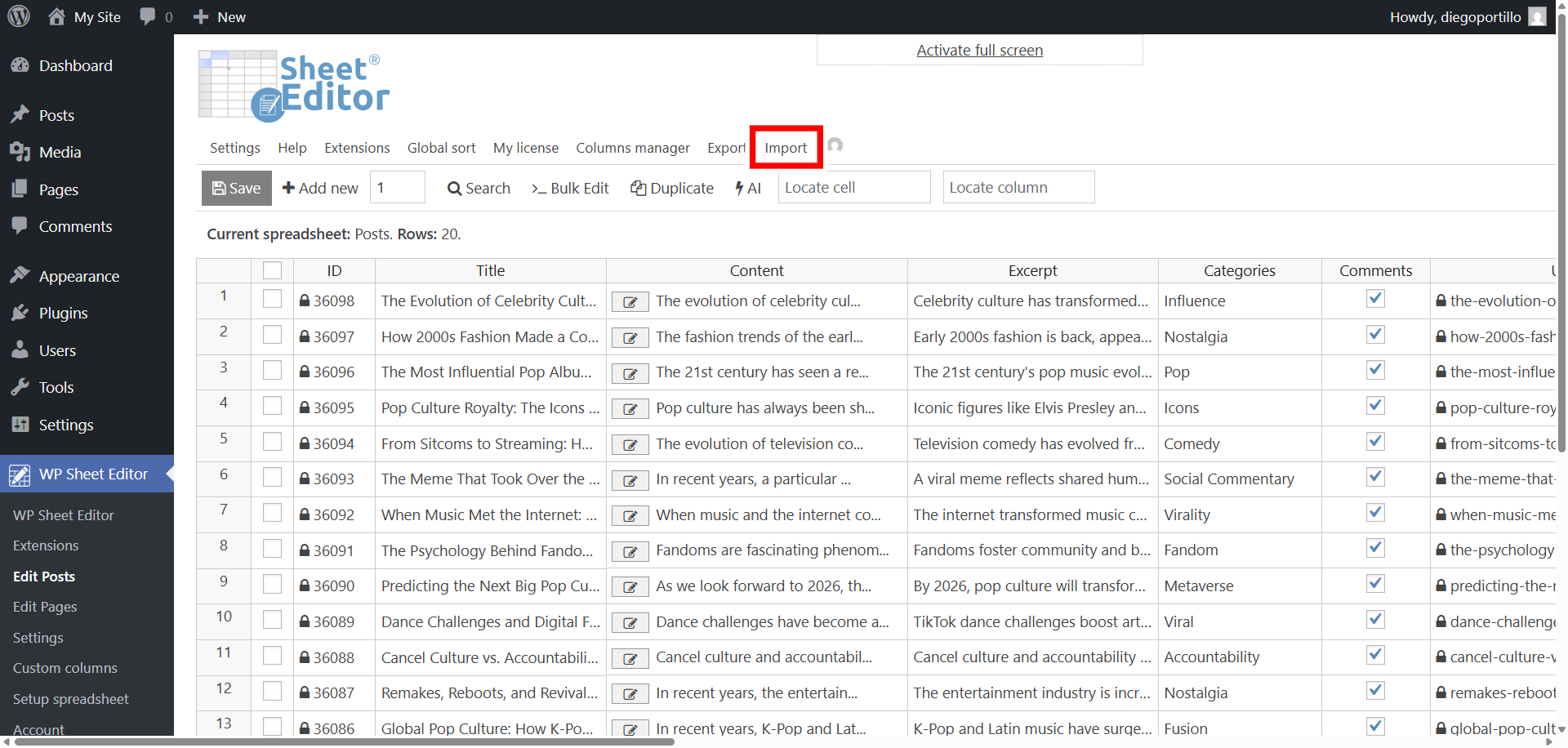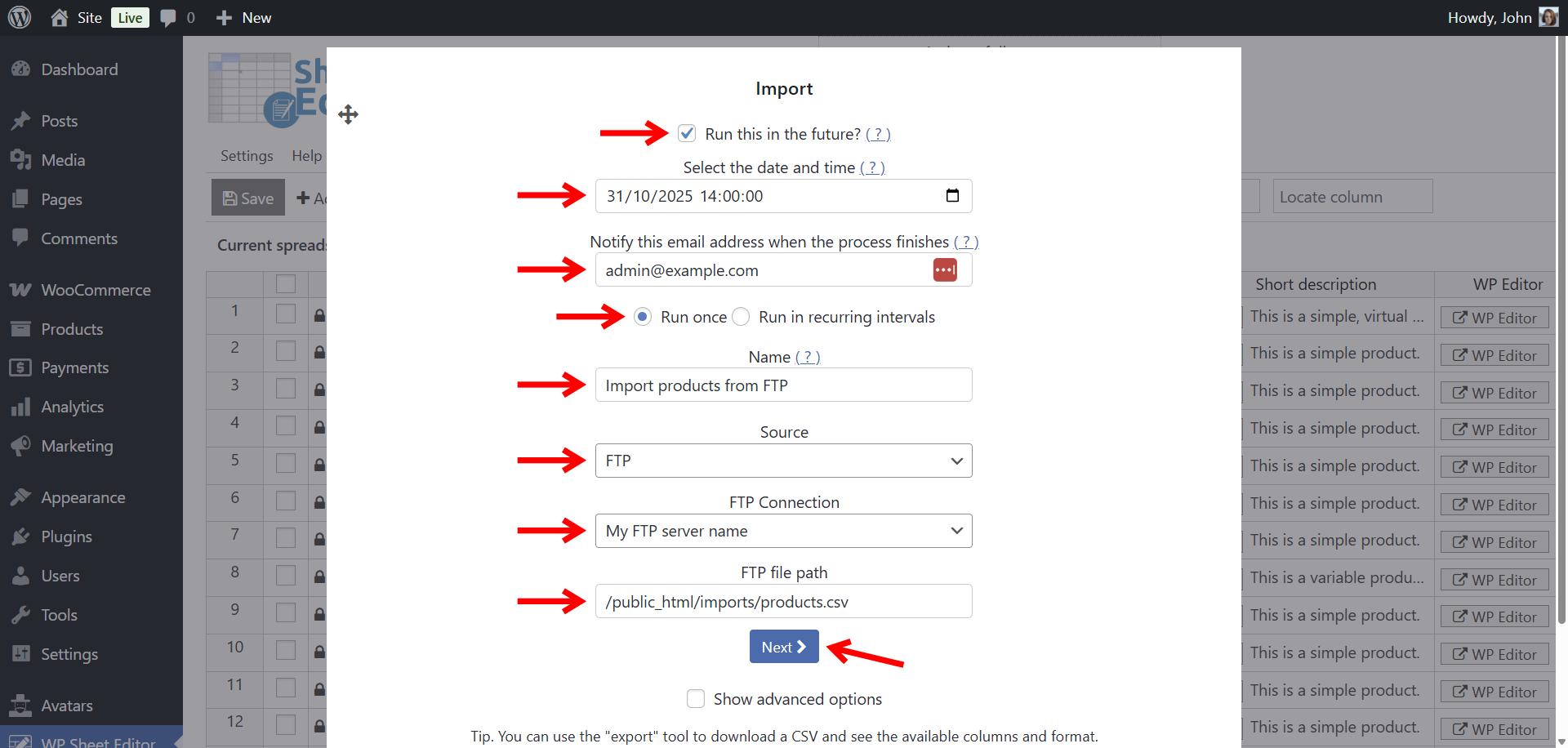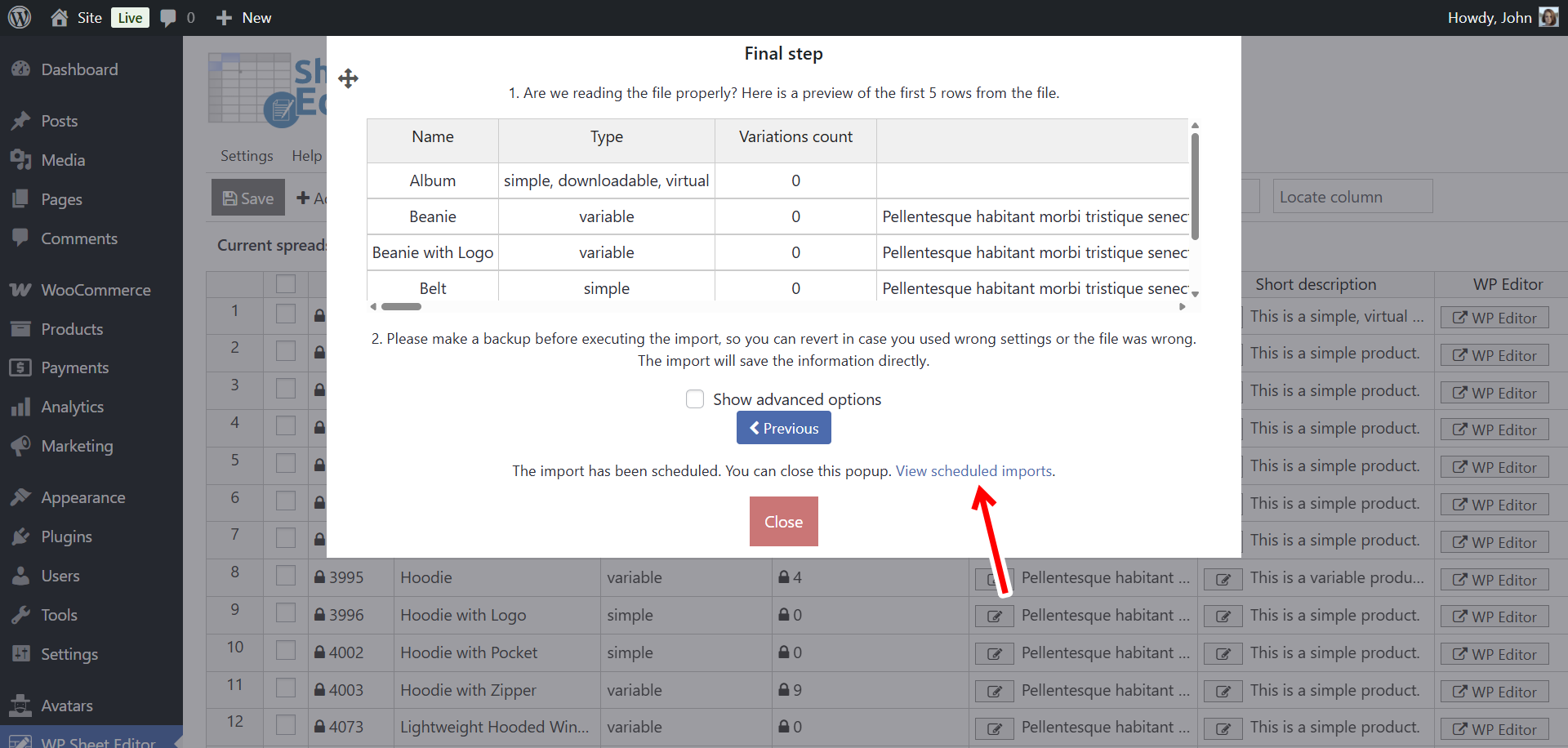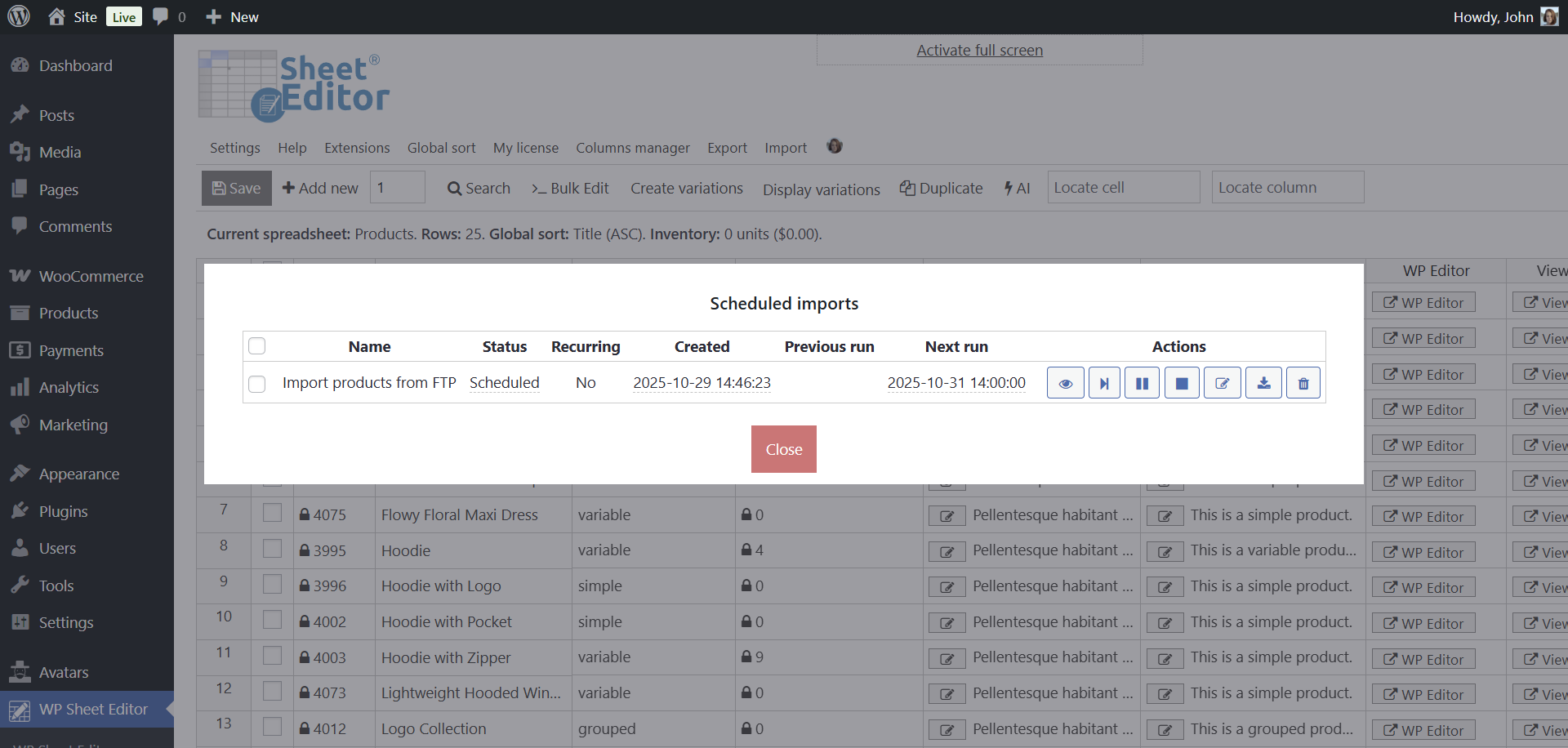Let’s learn how to import WooCommerce prices and stock from an FTP server into WordPress.
Running a WooCommerce store means constantly keeping your product data accurate, especially prices and stock levels. Outdated information can frustrate customers, cause lost sales, and create hours of manual work for store owners.
Many suppliers or ERP systems automatically send updated price and inventory files as CSVs to an FTP server. However, downloading and importing those files manually into WooCommerce can quickly become a daily burden, especially if you manage hundreds or thousands of products.
In this guide, you’ll learn a simple, secure, and fully automated workflow to import price and stock updates from an FTP server directly into WooCommerce. Using WP Sheet Editor and the Automations Add-on, you can connect your FTP files to WordPress, schedule automatic imports, and keep your store always synchronized, without touching a single CSV manually.
This approach saves time, prevents stock errors, and ensures your customers always see the most accurate product information on your site.
Required tools to update prices and stock from FPT
Before starting, make sure you have the following tools installed and activated on your WordPress site:
WP Sheet Editor – WooCommerce Products
This plugin gives you a powerful spreadsheet interface to manage all your WooCommerce products in bulk. You can edit prices, stock, descriptions, images, and more directly from the table, no need to open products one by one.
You can download the plugin here:
Download WooCommerce Products Spreadsheet Plugin - or - Check the features
Automations Add-on
This add-on extends WP Sheet Editor with advanced automation features. It lets you schedule and run tasks like imports, exports, and bulk edits automatically. In this guide, you’ll use it to set up a recurring import from your FTP server, so your WooCommerce prices and stock stay always up to date without any manual effort.
You can get the add-on here:
Before you start: prepare your CSV file
A clean, correctly formatted CSV prevents import errors and keeps your WooCommerce prices and stock levels synchronized. Verify the fields below before you upload or schedule your FTP import.
- Include a header row: The first row must contain clear column names that match WooCommerce/WP Sheet Editor fields, for example:
sku,regular_price,sale_price,stock_quantity,manage_stock,stock_status. - Use SKU as the unique identifier: Whenever possible use
skuto identify products. SKUs avoid ambiguous matches and reduce the chance of updating the wrong item. - Format prices correctly: Use a dot (
.) as the decimal separator (example:19.99). Do not include currency symbols or thousands separators. - Use integer stock values: Stock quantities should be whole numbers (example:
25). If you support backorders, include astock_statuscolumn with values such asinstock,outofstock, oronbackorder.
Tip: Run a small test import with 5–10 products first to confirm column mapping and formatting before scheduling a full or recurring import.
How to import WooCommerce price & stock from FTP
Follow these steps to import a CSV file from FTP into WooCommerce products.
Step 1 — Add FTP credentials to your “wp-config.php” file
For security, define FTP credentials in wp-config.php instead of the database. Paste and edit the block below with your server details. You may add multiple servers by duplicating the inner array.
define('WPSE_AUTOMATIONS_FTP_SERVERS', array(
array(
'name' => 'Supplier FTP',
'hostname' => 'ftp.example.com',
'port' => 22,
'username' => 'ftp-user',
'password' => 'ftp-password',
'secure' => true, // true = SFTP (recommended)
)
));
Step 2 — Open the “Import” tool
In WP Sheet Editor, open the WooCommerce products spreadsheet and click the Import button in the toolbar to launch the import wizard.
Step 3 — Select FTP as the data source
Select these values in the Import tool:
- Source: FTP
- FTP Connection: Choose the server you added in
wp-config.php. - FTP file path: Enter the path to the CSV file (for example
/exports/daily_inventory.csv). - Click Next.
Step 4 — Map CSV columns to WooCommerce fields
The editor reads your CSV headers and attempts to auto-map them. For price & stock imports map the relevant columns to these fields.
If the tool doesn’t map a column automatically, select the correct target field manually. When mappings look correct, click Next.
Step 5 — Choose import type & matching strategy
For price/stock updates you typically want to update existing items. Choose one of these options:
- Update existing items, ignore new items: recommended when you only receive updates for known products.
- Create new items and update existing: use if file can include new SKUs to add.
Matching strategy: set the importer to match rows by SKU (or Product ID if your CSV contains it). Matching by SKU avoids creating duplicates and guarantees updates land on the correct product.
Step 6 — Preview and run the import
Preview the first rows and confirm the mapped values (prices and stock). If everything is correct, click The preview is fine, start import. Monitor the progress in the import log and check a few product pages to confirm values updated as expected.
How to schedule an FTP import to update prices and stock
With the Automations add-on, you can schedule FTP imports to automatically update your WooCommerce product prices and stock levels. This lets your store stay synchronized with your supplier’s data without manual work. You can run it once or set it to repeat regularly, keeping your inventory and prices always current.
Step 1: Open the Import tool
From the top toolbar, open the Import tool to start setting up your scheduled FTP import.
Step 2: Set up the schedule and recurrence
In the Import tool, select the following options to schedule your automatic FTP import:
- Check Run this in the future.
- Select the date and time: Choose when the import should run.
- Notify this email address when the process finishes: Add your email to get a notification after each import.
- You can run this FTP import once or on a recurring schedule:
- Run once: The import will run only at the selected date and time.
- Run in recurring intervals: Choose how often it should repeat (every few minutes, hourly, daily, weekly, etc.) to keep your prices and stock always up to date.
- Name: Enter a clear name for your scheduled task, for example, “Daily Price and Stock Update”.
- Source: Select FTP.
- FTP Connection: Choose the FTP or SFTP server where your CSV file is stored.
- FTP File Path: Enter the exact path to your CSV file containing the latest prices and stock.
- Click Next.
Step 3: Map CSV columns to WooCommerce fields
After connecting to your FTP file, the editor will display all columns from your CSV. Now match each one with the correct WooCommerce field.
For example, your CSV might include columns like sku, regular_price, and stock_quantity. Map them to the corresponding WooCommerce fields so the plugin knows which products and values to update. Once everything is correct, click Next.
Step 4: Choose the Import type
Now decide how the import should update your products:
- Create new items and update existing items: Adds new products if needed and updates prices and stock for existing ones.
- Only update existing items, ignore new items: Updates prices and stock only for products that already exist.
If you’re updating existing items, select the field to identify them — usually the SKU — so the importer knows which product to update.
Click Next to continue.
Step 5: Preview and schedule the import
The tool will show a preview of your CSV data as it will be imported. Check that the prices and stock quantities look correct. If everything is fine, click “The preview is fine, start import” to schedule it.
Step 6: Manage scheduled imports
Now you’ll see the “View scheduled imports” link.
When you click on it, you’ll see all your scheduled imports. You can run them manually, pause, edit, or delete them anytime.
Scheduling FTP imports is an easy way to keep your WooCommerce prices and stock levels updated automatically. It removes the need for manual uploads and ensures your store always reflects the latest supplier data.
With WP Sheet Editor and the Automations add-on, you can build a completely automated system that saves time, prevents stock errors, and keeps your prices accurate every day.

